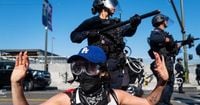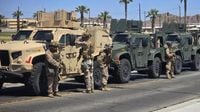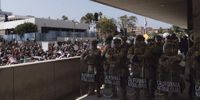In an unprecedented move that has sparked fierce debate and legal challenges, approximately 700 U.S. Marines from the Marine Corps Air Ground Combat Center in Twentynine Palms, California, have been mobilized to support National Guard troops amid escalating protests in Los Angeles. This deployment comes in response to widespread demonstrations triggered by recent Immigration and Customs Enforcement (ICE) raids across the city, which have ignited tensions over federal immigration enforcement policies.
The mobilization, confirmed by multiple Defense Department officials on June 9, 2025, marks a significant escalation in the federal government's response to the unrest. These Marines, part of the 2nd Battalion, 7th Marines, 1st Marine Division, were on a "prepared to deploy status" as designated by U.S. Northern Command over the preceding weekend. Their arrival is expected within 24 hours, with troops initially moving to Camp Pendleton in San Diego County before likely deploying to Los Angeles.
U.S. Northern Command stated that the Marines will "seamlessly integrate" with Title 10 forces under Task Force 51, which includes National Guard units protecting federal personnel and property in the greater Los Angeles area. This integration is intended to provide continuous coverage and bolster the federal presence amid ongoing protests. Currently, approximately 1,700 National Guard members are active in the region, having been deployed following President Donald Trump's executive order in response to what the administration has described as "incidents of violence and disorder" linked to the anti-ICE demonstrations.
Despite the military mobilization, the Marines and National Guard troops are operating under strict rules of engagement that prohibit law enforcement activities such as making arrests unless the Insurrection Act is invoked—a measure not expected to be used at this time. Their role is primarily defensive: protecting federal agents, buildings, and property. The troops are authorized to act in self-defense and to safeguard federal assets, but their involvement in direct policing remains limited.
The deployment has drawn sharp criticism from California's political leadership. Governor Gavin Newsom condemned the move as "un-American" and "unwarranted," characterizing it as a "deranged fantasy of a dictatorial President." Newsom emphasized that the Marines have historically served honorably in defense of democracy and should not be positioned against their fellow citizens. Similarly, Los Angeles Mayor Karen Bass criticized the federal government for escalating tensions, calling the National Guard deployment "political theater" and urging the cessation of immigration raids that have sparked the protests.
Mayor Bass highlighted the impact of the raids on local communities, noting that many targeted individuals are day laborers and families attending scheduled ICE appointments, rather than violent criminals as the administration claims. She warned that Los Angeles may be a "test case" for how far federal agents can extend their authority over state and local governments, a concern echoed by Governor Newsom's office, which filed a lawsuit against the Trump administration seeking to regain control over the California National Guard. The lawsuit argues that the federalization of the Guard without the governor's consent violates both statutory law and constitutional principles, particularly the Tenth Amendment.
President Trump, meanwhile, has defended the deployments and the use of military forces in Los Angeles. When questioned about sending Marines to the city, he responded, "We'll see what happens," asserting that the situation was "heading in the right direction" after initially being "in the wrong direction." Trump's administration has portrayed the protests as violent and disorderly, with the president labeling demonstrators "insurrectionists" and threatening a forceful response. His "border czar," Tom Homan, even suggested the possibility of arresting Governor Newsom and Mayor Bass for impeding federal efforts, a stance backed by Trump but rejected by California officials.
The involvement of active-duty Marines in domestic operations is rare and reminiscent of the 1992 Los Angeles riots, the last time Marines were mobilized within U.S. borders to support civil authorities. Legal experts note that the Insurrection Act, which allows for such military involvement, has not been invoked in this case, limiting the scope of the Marines' engagement. Department of Defense lawyers are still finalizing rules of engagement, expected to align with existing military protocols emphasizing de-escalation and self-defense.
Local law enforcement agencies have expressed concern about the lack of formal communication regarding the Marines' deployment. Los Angeles Police Chief Jim McDonnell stated that his department had not received official notification of the Marines' arrival, emphasizing the need for "open and continuous lines of communication" to prevent confusion and escalation. McDonnell reassured the public that the LAPD, with decades of experience managing large-scale demonstrations, remains confident in its ability to maintain order professionally and effectively.
The protests themselves have been marked by a mix of peaceful demonstrations and episodes of violence. Over the weekend, police arrested at least 56 individuals on charges ranging from failure to disperse to attempted murder with a Molotov cocktail and assault with a deadly weapon. Officers faced minor injuries, and even police horses were targeted. Authorities used less-lethal weapons, including flash-bang grenades and pepper balls, to disperse crowds, drawing criticism from civil liberties groups and journalist organizations.
Notably, Australian journalist Lauren Tomasi was struck by a less-lethal round while reporting live, an incident that drew international condemnation. Australian Prime Minister Anthony Albanese called the footage "horrific" and raised the matter with U.S. officials, emphasizing the importance of press freedom. The Los Angeles Police Department has launched an investigation into the incident, underscoring concerns about the treatment of media personnel during the unrest.
The American Civil Liberties Union also criticized the deployment of active-duty troops, labeling it an unnecessary escalation that raises serious constitutional concerns. The ACLU's National Security Project director, Hina Shamsi, stated, "The idea that these Marines have anywhere near the kind of training required to police protests while respecting people’s constitutional rights would be laughable if the situation weren’t so alarming."
The protests were initially sparked by ICE raids conducted on June 6 and 7, 2025, targeting multiple locations in Los Angeles. The raids resulted in dozens of arrests, many of which have been described by local leaders as "chaotic federal sweeps" aimed at meeting arbitrary arrest quotas rather than focusing on violent offenders. Families of detainees have voiced distress over the lack of communication and the emotional toll of the detainments, with some unable to inform young children about their relatives' absence.
Beyond the immediate unrest, the situation has broader implications for federal-state relations and the role of the military in domestic affairs. California Attorney General Rob Bonta emphasized that the president's authority to federalize the National Guard is limited and that the current actions constitute an abuse of power. He also highlighted the timing of the deployment during California's wildfire season, noting that the removal of National Guard troops from their traditional duties could hinder critical emergency response efforts.
As the protests continue, community leaders and activists call for peaceful demonstrations and urge the federal government to halt immigration raids. Pastor Lucia Chappelle, who marched with protesters, summarized the sentiment: "My message to ICE is: Leave us alone. These are family people, my neighbors, people who have not hurt anyone." Meanwhile, voices within the city, such as Los Angeles resident Najee Gow, caution against violence that could play into federal narratives and justify further militarization.
Senator John Fetterman criticized the protests' violent elements as "anarchy and true chaos," while Senate Minority Leader Chuck Schumer condemned the federal response as "unnecessary, inflammatory, and provocative." House Minority Leader Hakeem Jeffries accused President Trump and his allies of having "zero credibility" on law and order, highlighting the administration's history of pardoning violent offenders and downplaying the seriousness of the January 6 Capitol attack.
As of June 10, 2025, the situation in Los Angeles remains tense, with the presence of military and National Guard forces signaling the federal government's determination to maintain control. The legal battles initiated by California's leadership challenge the constitutionality of these actions, underscoring the ongoing struggle over authority and civil liberties in the face of domestic unrest.
The coming days will likely prove critical in defining the balance between security and freedom, federal authority and state sovereignty, and the role of the military within American society.



